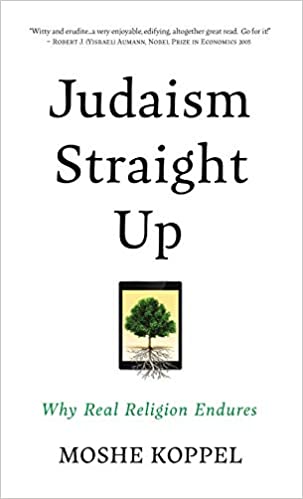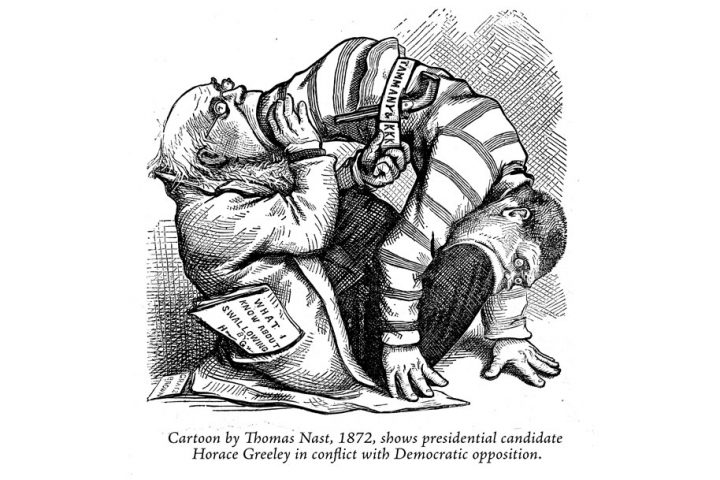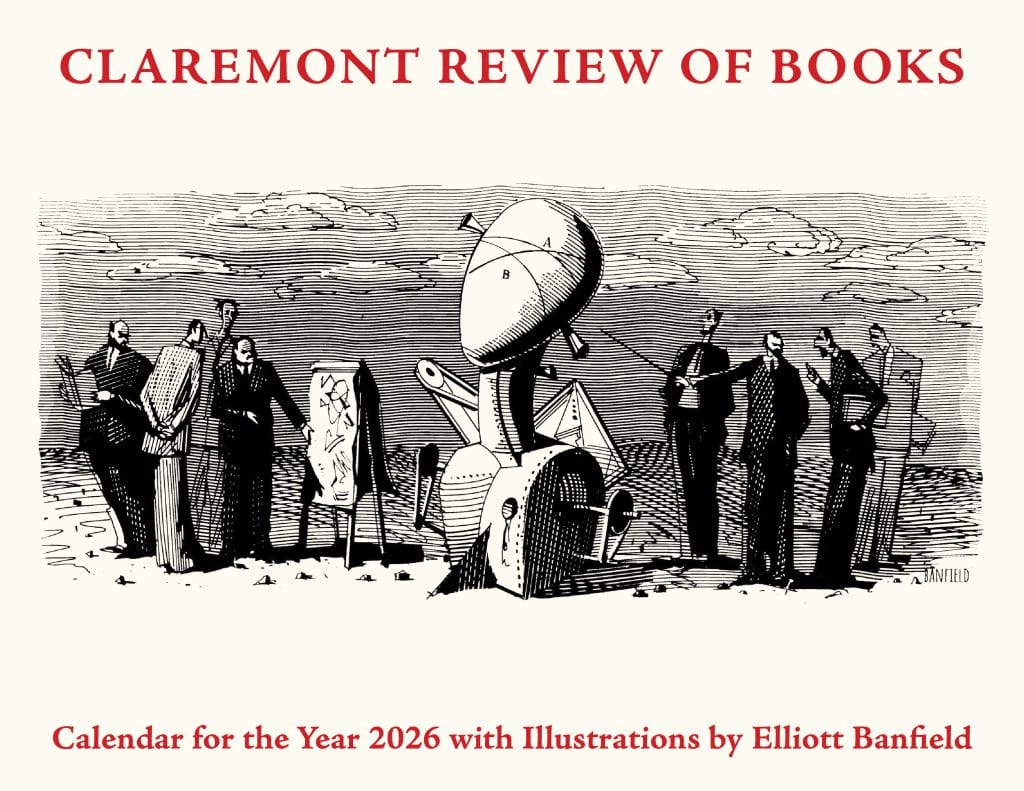Book Reviewed
Britain’s late Chief Rabbi Jonathan Sacks once asked historian Paul Johnson, author of an excellent History of the Jews (1987), what most impressed him about Judaism. Johnson replied that Judaism, being a religion of strong individuals and strong communities, presents a rare balance between the individual and the collective.
Distinguished computer scientist, conservative activist, and scholar of Judaism Moshe Koppel proposes another answer: the balance between received tradition and reasoned innovation. He contends that observant Jewish communities uniquely realize the conservative view defended by Edmund Burke and Alexis de Tocqueville, offering an example of continuity and adaptiveness found in few other Western communities. Koppel is a gifted pedagogue, a master at explaining philosophical problems to the general reader by means of anecdote and aphorism. His eloquent, erudite book merits close attention.
“This disenchanted world comprised of individuals without religious communities,” Koppel writes of the secular West, “is not in equilibrium. Bereft of tradition, individuals can’t simply reason their way to rules that encourage virtue, and they can’t spontaneously develop a strong sense of common purpose.” Traditions “are essential for a society’s viability,” Koppel stresses, but “taking traditions too seriously could itself be harmful.” Traditions themselves were once innovations. The failure to adapt “is exceedingly maladaptive.”
***
A viable society “requires mechanisms for handling subtle tradeoffs, including balancing both moral intuition with conscious reasoning, and popular practice with elite leadership.” This balance is preeminently found in Judaism. Jewish law (halakha) employs “both intuition and reasoned formalization of that intuition,” through the give-and-take of popular consensus and rabbinic guidance. “Jewish tradition,” moreover,
includes a mechanism for making such deviant paths unlikely: it mandates respect for, and hence emulation of, those with deep knowledge of and commitment to the principles and sensibilities embodied in tradition…. [T]he consensus that emerges gives weight to the practices of all those committed to tradition, but gives more weight to those who are recognized as authorities.
Koppel draws on game theory to argue that versions of this weighted-majority strategy, which distributes influence broadly but unequally, “have a higher probability of yielding the right answer than both egalitarianism, in which all opinions get equal weight, and pure elitism, in which only expert opinions count.” The “weighted-majority” framework won’t always achieve optimal outcomes, but it’s best suited to find remedies for suboptimal outcomes.
Efforts by the rabbinic elite to purge popular practice of time-honored customs have often foundered on popular resistance, yet the halakha “remains substantive and adapts slowly and steadily precisely because…those who don’t share its underlying principles cease, by mutual consent, to be voting members.” But this raises a problem: how might the Gentile world reproduce a weighted majority?
***
The Jewish world puts an unparalleled effort into elite-formation. As of 2015 Israel had 108,000 full-time adult students in religious schools; nearly as many men engage in full-time Torah study in the United States. Hundreds of thousands of Jews, moreover, read all 2,711 pages of the Babylonian Talmud in a seven-and-a-half-year cycle through the daf yomi, or “daily page” program. That compares to 118,990 Catholic seminary students in 2010, from a religious population almost a thousand times as large. Elite rabbinic authority is accepted among observant Jews not merely because it is elite, but because religious Jews evince extensive knowledge of the issues.
But reason alone is not enough for a viable society. “[P]eople can’t live coherent lives without certain unfounded beliefs,” writes Koppel, “of which the classic examples are free will, scientific induction, and morality.” Philosophy cannot derive moral maxims from first principles. Yet “we could not lead coherent lives without believing that some actions are morally preferable to others.”
Free will, induction, and morality are not our only necessary beliefs. “Each of us must believe in the viability of the culture of which we are a part,” Koppel explains. “[W]e would be paralyzed by dread if we did not believe that we are engaged in some project that connects that which has preceded us with that which will succeed us and that gives context and direction to everything we do.” We can come to terms with the prospect of our own death if our life has a purpose beyond our physical existence, but we cannot overcome the dread of the death of our culture. “Suppose,” Koppel writes, “that most of the human population would be spared [from a plague], except for anyone who remotely shared your culture…? [Y]ou’d still find that your life had lost its purpose and that even pistachio ice cream didn’t quite taste the same.”
This is Koppel’s most striking argument. Until this point in his book, many conservatives will find themselves nodding in agreement. But here he asserts that an impulse outside rational calculation—the desire to persist after we are dead and buried—drives human behavior. We want to live forever, which is unreasonable. But that is the promise of the Jews: after each of seven weekly Torah segments is read, a congregant blesses God “who has given us his Torah and planted eternal life among us.”
***
Not just individuals but also tribes and nations despair when their future no longer seems viable. From the trenches of World War I Franz Rosenzweig wrote that the nations of the world “foresee a time when their land with its rivers and mountains still lies under heaven as it does today, but other people dwell there; when their language is entombed in books, and their laws and customs have lost their living power.” That is why “[t]he love of the peoples for their own ethnicity is sweet and pregnant with the presentiment of death.” When this presentiment intrudes on the present, nations can go mad. Why do nations die? Because they want to.
That bears on the issue of Jew-hatred. “[D]ifferent groups,” Koppel writes,
each in its own way, wish to bring salvation now by choosing either particularism or universalism to the exclusion of the other. They are exasperated by Jewish patience in waiting for an ever-deferred Messiah, and they are incensed by the Jews’ implicit insistence on the possibility of reconciling particularist traditions and loyalties with fairness to others. Almost nobody can abide these Jewish claims. Not those Christians who wish to bring salvation now through universal acceptance of Christ. Not those Muslims who wish to bring salvation now through the restoration of the Caliphate. Not racists who wish to bring salvation now by eliminating inferior races.
This is a deep insight into the source of anti-Semitism, yet it does not distinguish between quotidian repugnance and genocidal rage. Here Koppel might have expanded the concept of dread arising from the prospect of social death. In its worst manifestation, anti-Semitism is the rancor that the dying bear toward the eternal people. The humiliated Germans after World War I wallowed in morbid fears of national or racial extinction and projected these fears onto the Jews.
Koppel’s meditation on anti-Semitism, moreover, doesn’t capture the relationship of Jews to Christianity. No one desires salvation through the universal acceptance of Christ with the urgency of American evangelicals, who have become history’s first case of mass philo-Semites. Their grandparents—Bible-belt Protestants of the mid-20th century—were anti-Semites. As Christians found themselves a minority culture during the 1960s, the same Protestants came to see the Jewish people as living proof of God’s love and intervention in history.
***
Koppel’s final chapters examine the fracture of the Jewish world, not only between secular and religious Jews, but between the religious who espouse otherworldly quietism and those who view the State of Israel as a religious project. During the two millennia between the Fall of the Second Temple in Jerusalem in A.D. 70 and the creation of the State of Israel in 1948, dispersed Jewish communities maintained a continuity of liturgy and law so robust that a rabbinical ruling in Cairo would be honored in Speyer, and a Jew from Lithuania could pray without difficulty at a synagogue in Baghdad. Judaism acknowledged a received rabbinic tradition despite the florid diversity of community customs. But a Jewish state presents a new challenge. Israel was founded by secular, mainly socialist, Zionists. Most observant communities remained indifferent or hostile to Zionism—until the Holocaust. Israel’s founding began as a challenge to traditional Judaism.
Koppel has considered this problem for decades, as the author of a proposed draft constitution for the State of Israel and a frequent consultant on legislation. The balance between the Jewish character and the Israeli state is elusive. The late Michael Wyschogrod proposed a constitutional monarchy without a king, a perpetual regency in which the elected president would serve as regent for the absent successor of King David, to be restored to his throne at such future time as prophecy might identify him. Baroque as this plan might seem, it attempts to limit the pretensions and power of the practical State of Israel while symbolically incorporating the apocalyptic hopes of the Jewish people for messianic redemption. The Jewish response to existential dread is to embody the future in the present; the practice of Judaism is not the search of lost time but rather the realization of the future in present practice. Jews cling stubbornly to their customs not out of stubbornness but because they anchor expectations of the future in the Jewish present.
***
Koppel’s hope is that the give-and-take of communal piety and rabbinic authority will continue to inform Jewish life in Israel as it did in the Eastern European past. He has no patience for secular Israelis who eschew religion or the ultra-Orthodox who abhor the Israeli state. Nor does he identify with the “national religious,” which he dismisses as “a new hyphenated ideology in which statism is reinterpreted in religious terms and Judaism takes on a statist character.” Koppel identifies with the traditional Jews who view with suspicion the idea of a religious state. They “could never imagine, for example, what good could come from a rabbi appointed to a community by distant government bureaucrats, probably on the basis of patronage.”
Jews can learn something from conservative political philosophy, Koppel concludes: “Israel needs to provide its citizens freedom not only from foreign enemies and foreign cultures, but from their own government and from unelected power-brokers.” To this I add my own “amen,” but with a caveat. Judaism has a revolutionary face as well as a traditional one. Its foundational premise, after all, is the irruption of God into human affairs, and its practice rests not on natural law but on the divine mandate at Mount Sinai.
***
Rabbi Joseph Dov Soloveitchik, the intellectual leader of 20th-century Modern Orthodoxy, wrote of Rabbi Akiva’s second-century call on the Jews to revolt against Rome:
There was a revolutionary message in Rabbi Akiva’s urging his people to revolt against the Romans. The concept of a slow historical process that was popular among the peoples who lived under the influence of Greek philosophy…carries weight and significance so far as time is lived through quantitatively. Then the forces of history move with an extremely slow pace; years, decades, and centuries are nothing but drops in the sea of eternity.
But Judaism, Soloveitchik adds,
challenges man, not to live in time, but to mold it, to give to the indifferent chronos new aspects and new interpretation. Time is computed according to man’s own creativity and self-determination. A qualitative time experience enables a nation to span a distance of hundreds and thousands of years in but a few moments.
Soloveitchik believed that the birth of the Jewish state was such an experience.
Moshe Koppel emphasizes the Burkean aspect of Judaism, its adherence to received tradition and communal rootedness. Conservative philosophy can learn a great deal from Judaism (and vice versa), but the apocalyptic hope of the Jewish people never will be commensurate with any mode of secular thinking.







